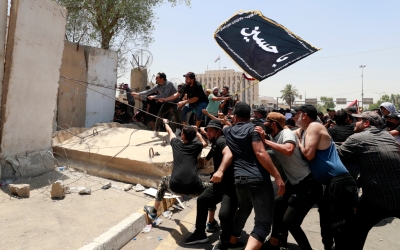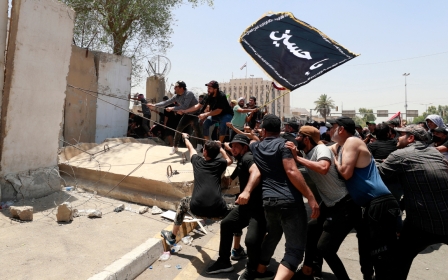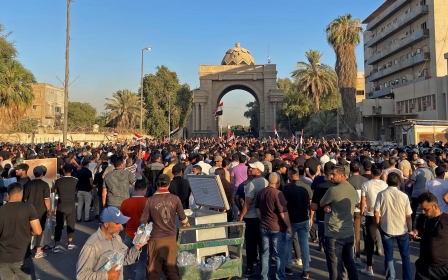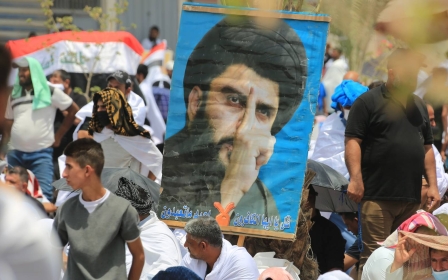Iraq: Muqtada al-Sadr's supporters vow to continue occupation of parliament
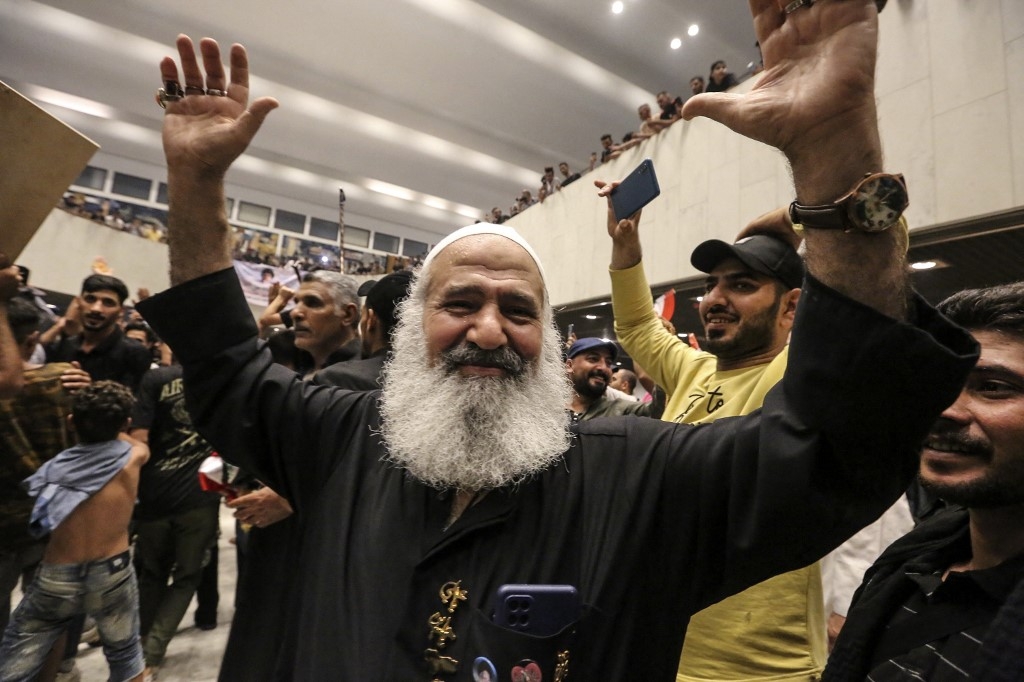
Supporters of the influential Shia cleric Muqtada al-Sadr have vowed to continue their occupation of the Iraqi parliament for a second day as the country's political crisis continues to deepen.
Hundreds of demonstrators on Saturday stormed the parliament building for the second time in four days, with scores of protesters and police reported injured.
Nearly 10 months after October elections, Iraq is still without a new government despite intense negotiations between factions.
The immediate trigger for the occupation was the decision by a rival Shia bloc, which is pro-Iran, to pick former cabinet minister Mohammed Shia al-Sudani for the prime minister's post.
Waving Iraqi flags and flags that represent Sadr's party, demonstrators, some of whom threw stones, battled through tear gas and water cannons to force their way into the legislative chamber.
New MEE newsletter: Jerusalem Dispatch
Sign up to get the latest insights and analysis on Israel-Palestine, alongside Turkey Unpacked and other MEE newsletters
Earlier, demonstrators had pulled down heavy concrete barricades on roads leading to Baghdad's fortified Green Zone of diplomatic and government buildings.
The health ministry said at least 100 protesters and 25 security personnel were hurt in the confrontations, which took place amid temperatures that touched 47C.
In their previous occuption of parliament on 27 July, the protesters left on Sadr's orders after about two hours inside.
On Sunday morning, the protesters marked the Muslim month of Muharram, a traditional Shia celebration, with religious chants and collective meals.
"We were hoping for the best but we got the worst," said protester Abdelwahab al-Jaafari, 45, a day labourer with nine children, referring to the latest post-election developments.
Another protester said: "The politicians currently in parliament have brought us nothing."
Volunteers distributed soup, hard-boiled eggs, bread and water to the protesters. Some had spent the night inside the air-conditioned parliament building with blankets spread out on the marble floors.
Others took to the gardens on plastic mats under palm trees. Following the October elections, Sadr's political bloc came out with the biggest parliamentary faction but fell short of a majority.
In June, 73 of Sadr's parliamentarians quit, leading to Sudani's pro-Iran block becoming the largest in parliament, but still there was no agreement on naming a new prime minister, president or cabinet.
Calls for dialogue
The protests are the latest challenge for a country trying to overcome decades of war and now facing the impact of climate change.
Despite oil wealth and elevated global crude prices, Iraq remains hobbled by corruption, unemployment and other woes, which sparked a youth-led protest movement in 2019.
As a result of past deals, the Sadrists have representatives at the highest levels of government ministries and have been accused by their opponents of being as corrupt as other political forces.
But protesters see in Sadr an opposition figure and champion of the anti-corruption fight.
One of them, Oum Hussein, 42, said the sit-in sought a government of "people with integrity who serve the country".
She accused Sadr's opponents of choosing for a new government figures "known for corruption".
Sudani is the prime ministerial choice of the Coordination Framework alliance, which includes lawmakers from the party of Sadr's longtime foe, ex-prime minister Nuri al-Maliki.
It also represents the pro-Iran former paramilitary group Hashd al-Shaabi, now integrated into the regular forces.
On Sunday, a spokesperson for the European Union expressed concern about "the ongoing protests and their potential escalation". The EU called for "constructive political dialogue".
United Nations Secretary-General Antonio Guterres urged "peaceful and inclusive dialogue" to form an effective national government, his spokesperson said.
Iraqi Kurdish authorities in the country's north offered to host talks in their capital Erbil.
Middle East Eye delivers independent and unrivalled coverage and analysis of the Middle East, North Africa and beyond. To learn more about republishing this content and the associated fees, please fill out this form. More about MEE can be found here.


